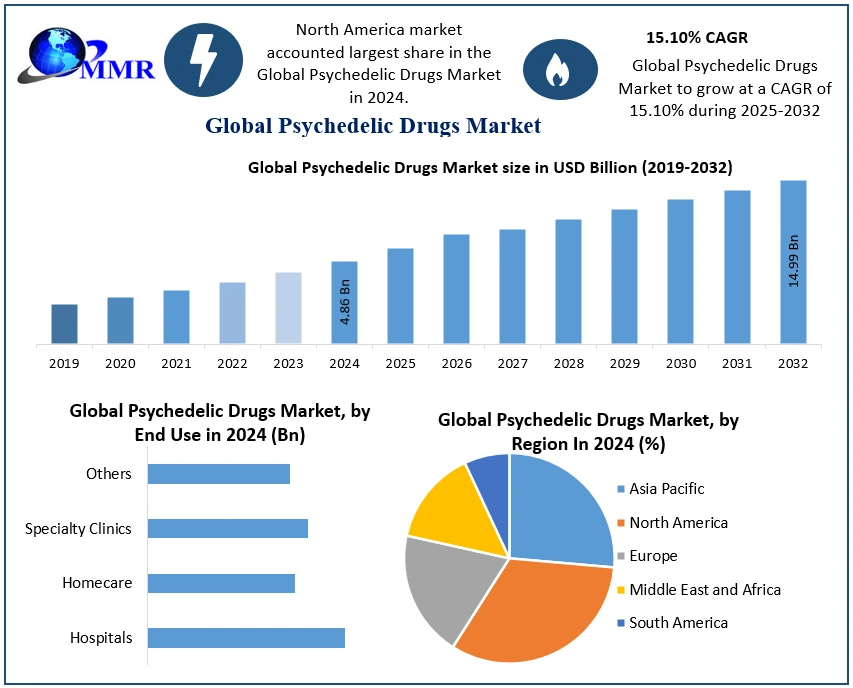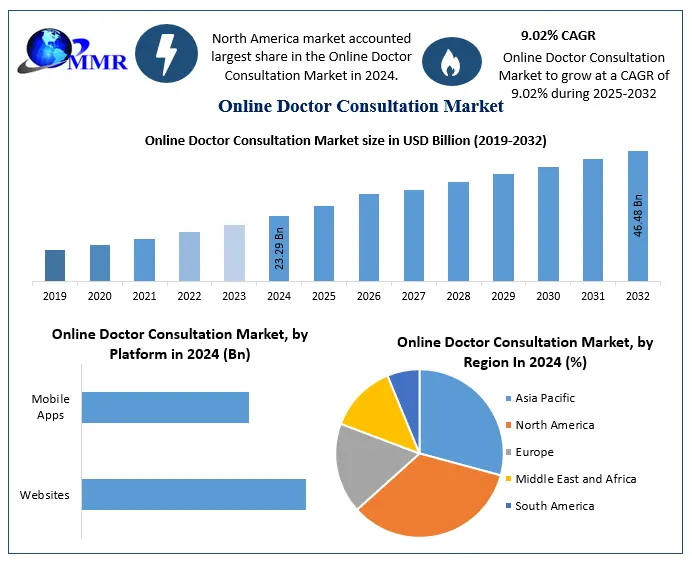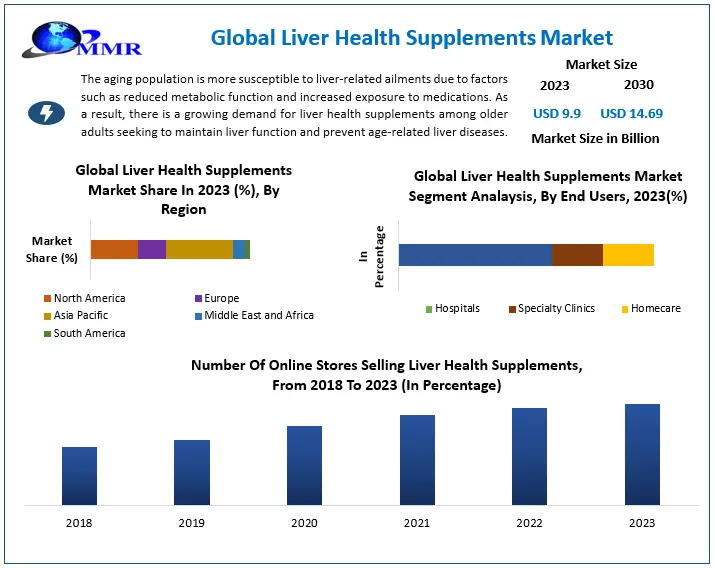Psychedelic Drugs Market to Surge to $11.34 Billion by 2030, Driven by Mental Health Innovations and Regulatory Shifts
The Psychedelic Drugs Market is on a transformative trajectory, projected to expand from $4.23 billion in 2023 to $11.34 billion by 2030, registering a robust compound annual growth rate (CAGR) of 15.10% during the forecast period . This growth underscores a paradigm shift in mental health treatment, with psychedelics emerging as promising therapeutic agents for various psychiatric disorders.
Market Estimation & Definition
Psychedelic drugs, encompassing substances like psilocybin, lysergic acid diethylamide (LSD), and 3,4-methylenedioxymethamphetamine (MDMA), are known for their ability to alter perception, mood, and cognitive processes. Traditionally associated with counterculture movements, these compounds are now being rigorously studied for their potential in treating mental health conditions such as depression, anxiety, post-traumatic stress disorder (PTSD), and substance use disorders.
The market’s valuation at $4.23 billion in 2023 reflects a growing acceptance and integration of these substances into therapeutic protocols. With ongoing research and clinical trials demonstrating efficacy, the market is poised for significant expansion, reaching an estimated $11.34 billion by 2030 .
Market Growth Drivers & Opportunities
Several factors are propelling the growth of the psychedelic drugs market:
-
Rising Prevalence of Mental Health Disorders: Globally, mental health conditions are on the rise, with depression and anxiety leading the charge. Traditional treatments often fall short, creating a demand for alternative therapies .
-
Advancements in Clinical Research: Recent studies have highlighted the potential of psychedelics in treating various psychiatric conditions. For instance, psilocybin has shown promise in alleviating symptoms of major depressive disorder .
-
Regulatory Shifts: Countries like the United States and Germany are witnessing changes in regulatory frameworks, facilitating research and, in some cases, therapeutic use of psychedelics. The U.S. Food and Drug Administration (FDA) has granted “breakthrough therapy” designations to certain psychedelic-assisted therapies, expediting their development and review processes.
-
Increased Investment: The pharmaceutical industry is witnessing a surge in investments aimed at developing psychedelic-based therapies. Companies are channeling funds into research, clinical trials, and infrastructure to support the anticipated demand.
-
Public and Medical Community Acceptance: The stigma surrounding psychedelics is diminishing, with both the public and healthcare professionals recognizing their therapeutic potential. This shift is crucial for the integration of psychedelics into mainstream medicine.
Curious to peek inside? Grab your sample copy of this report now:https://www.maximizemarketresearch.com/request-sample/124231/
Segmentation Analysis
The psychedelic drugs market is segmented based on drug type, application, end-use, and geography:
-
By Drug Type:
-
Lysergic Acid Diethylamide (LSD): Known for its potent psychoactive effects, LSD is being explored for its potential in treating anxiety and depression.
-
3,4-Methylenedioxymethamphetamine (MDMA): Commonly associated with recreational use, MDMA is under investigation for its efficacy in treating PTSD.
-
Psilocybin: Derived from certain mushrooms, psilocybin has shown promise in treating major depressive disorder and is leading the market in terms of research focus.
-
Gamma Hydroxybutyric Acid (GHB): Used medically for narcolepsy, GHB is also being studied for its potential in treating alcohol dependence.
-
Others: Including ketamine, ayahuasca, and salvia, each with unique therapeutic potentials.
-
-
By Application:
-
Major Depressive Disorder: A significant focus area, given the global burden of depression.
-
Treatment-Resistant Depression: Addressing patients who do not respond to conventional therapies.
-
Panic Disorder and PTSD: Exploring the anxiolytic properties of psychedelics.
-
Opiate Addiction and Narcolepsy: Investigating the role of psychedelics in addiction treatment and sleep disorders.
-
-
By End-Use:
-
Hospitals and Specialty Clinics: Primary centers for administering psychedelic-assisted therapies.
-
Homecare: Emerging models are exploring the feasibility of at-home treatments under professional supervision.
-
Others: Including research institutions and academic centers.
-
Country-Level Analysis: USA and Germany
United States: The U.S. is at the forefront of psychedelic research and therapy integration. The FDA’s “breakthrough therapy” designations for psilocybin and MDMA-assisted therapies have accelerated clinical trials. States like Oregon and Colorado have legalized psilocybin-assisted therapy, setting precedents for others. The U.S. market is characterized by robust investment, with companies like Mind Medicine Inc. (MNMD) and Compass Pathways Plc (CMPS) leading clinical research and development efforts.
Germany: Germany is emerging as a key player in the European psychedelic market. Companies like Atai Life Sciences, headquartered in Berlin, are spearheading research into various psychedelic compounds. The German regulatory environment is gradually becoming more conducive to psychedelic research, with increasing public and governmental interest in alternative mental health treatments.
For deeper market insights, peruse the summary of the research report:https://www.maximizemarketresearch.com/market-report/psychedelic-drugs-market/124231/
Competitive Landscape
The psychedelic drugs market is characterized by a mix of established pharmaceutical companies and innovative startups:
-
Atai Life Sciences (ATAI): A German biopharmaceutical company focusing on developing psychedelic and non-psychedelic compounds for mental health disorders. The company is involved in multiple clinical trials exploring various compounds.
-
Compass Pathways Plc (CMPS): A UK-based company conducting extensive research into psilocybin therapy for treatment-resistant depression. Their proprietary COMP360 psilocybin formulation is undergoing Phase III clinical trials.
-
Mind Medicine Inc. (MNMD): A U.S.-based company developing psychedelic-inspired medicines and therapies, with a focus on LSD and other compounds for anxiety and ADHD.
-
Jazz Pharmaceuticals: Known for its product Xyrem (sodium oxybate), used in treating narcolepsy, Jazz is exploring the potential of GHB in other therapeutic areas.
-
Cybin Corp.: A Canadian company working on developing psychedelic-based therapeutics and delivery systems, aiming to improve the scalability and accessibility of these treatments.
These companies are investing heavily in research and development, clinical trials, and strategic partnerships to advance the field of psychedelic medicine.



